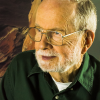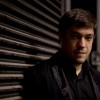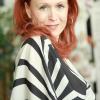Home » Jazz Articles » Catching Up With » Alberto Pibiri: Living His Jazz Dreamlife
Alberto Pibiri: Living His Jazz Dreamlife

Courtesy Daniela Zedda
I never feel established. I always feel I'm moving towards what's next. It's all a work in progress.
—Alberto Pibiri
All About Jazz: Just where in Italy are you from?
Alberto Pibiri: I'm from south Sardinia, the beautiful island below Corsica. My home town is called Cagliari.
AAJ: When did you begin to play music?
AP: My dad plays a little bit of piano. So, when I was a kid, I was listening to him playing, and like every kid, [I was] curious to check what he was doing. I was actually imitating him playing without knowing anything about the instrument. So, my mom thought it was a good idea to give me piano lessons. She had a friend from Russia, a piano teacher, so I started music lessons with her when I was seven years old. I was lazy at that time, I wasn't really dedicated, but I started listening to jazz in my primary school. My history teacher was actually a jazz drummer. He introduced me to a local jazz pianist in Cagliari. I started classes with him at the age of 10, and I was also doing classical music. So, I started very young playing both styles of music, but slowly I started to listen more to jazz. When I was between 11 and 13 years old, my piano teacher had a band that rehearsed every weekend, and I used to go to listen, and sometimes to sit in. I feel really lucky because at a very young age I was surrounded by jazz musicians, and there the music scene was very limited. That was my early formation.
AAJ: Are your parents interested in jazz?
AP: Actually, not that much! My mom loves classical music. And my dad is more into rock music. I remember one time when me and my dad went on holiday. I was about 12 or 13 years old, and I had cassettes at the time, and during the trip, I played Louis Armstrong and the Hot Five cassettes, because I loved so much this music. This music has stayed with me. Then I started listening to bands like Count Basie and Duke Ellington, and I was absorbing all this at a very young age while all my friends listened more to rock or Italian pop music, so that was very unusual. It was also an unusual way to learn because usually people start learning jazz when they are older.
AAJ: I read that you traveled to France to study music. Where was that?
AP: After I graduated from my classical studies in the conservatory of Pierluigi da Palestrina in Cagliari, I wanted to learn as much as possible. I decided to go to Paris because I didn't have the money to come to the United States. To live in New York, it's always been my dream since I was a child, because my jazz mates at the time they all talked about New York's music scene and the jazz musicians living there. Before arriving in the Big Apple, I had many steps, and one was to go to Paris and start working there. Most of the time I learned my craft by playing with other musicians, talking about music on the job and after. I've been lucky enough to always get hired as a sideman.
AAJ: How long did you stay in France?
AP: I worked in France for about eight years, playing in the famous jazz clubs like Sunset-Sunside or Le Duc des Lombards. By listening to records, I developed a huge passion for Oscar Peterson, my idol, and musical mentor. Unfortunately, I never had the chance to meet him personally. But I know his music very well, and I used to compose and arrange music inspired by him.
AP: Luckily, I met the famous singer, Sheila Jordan, through a friend, a French pianist who used to play with Sheila. She was the first one who suggested that I go to the USA. She became my sponsor for my artist visa. We collaborated together many times: first in Paris with some of her workshops and then in New York. She's wonderful. We are really good friends. Four or five years ago, I took her to Sardinia and we did a show in the well-known Calagonone Jazz festival. I'm very grateful to her. Between those years, I did a couple of workshops as a student in Veneto jazz, an organization that organizes summer jazz workshops. They would bring New School faculty to Venice, and I did this workshop for about four years every summer. Through them I met the singer Kate Baker, and the jazz guitarist Dave Stryker, both New Jersey residents. We became friends and collaborators. As I said, Sheila Jordan was my sponsor for my first visa, and Dave Stryker became my sponsor for my next one. I actually did a couple of records together with them, one with Sheila and one with Dave. I've been very honored by that.
I came to the United States, I think around 2000-2001 as a tourist first. And I had been in love with New York, so in love that this is the city where I want to live. My inner voice was telling me, "You will have a great time." I followed it. I got confirmation that New York was the city where I was spending the rest of my life. I started to go to jazz clubs and play in the jam sessions.
AAJ: When did you come over to stay?
AP: I think about 10 years ago. around 2011, and the rest is history. I've been lucky to produce my first record with Dave Stryker on guitar, Marco Panascia on bass and Brian Floody on drums. It's called NYC, all originals of mine and Dave Stryker's. Three or four years later, I did Jazz Legacy. with my collaborators including Adrian Cunningham, saxophone, my wife, Miriam Waks on voice, Dave Stryker on guitar, Sheila Jordan and Jay Clayton on voice. I always give credit to people that I play with to honor them. That's very important to me.
AAJ: When you moved to New York, did it take you long to establish yourself and find work?
AP: First, I never feel established. I always feel I'm moving towards what's next. It's all a work in progress. I'm always looking for new things and projects to do. But in terms of apartments, I lived around Harlem for the first five or six years. When I got married about three years ago, we bought a place in Long Island, where I currently live.
In terms of gigs, you go to the jam session. I remember the first years, I used to go every night to Smalls and to Fat Cat and play until 3am. By the way, that's where I met Adrian Cunningham, and how I started to get gigs. That's how people knew me. If you stick around Smalls or Mezzrow, you meet everybody, that's actually the best place to hang.
I didn't have much jazz academic background. The best way to learn jazz is just by doing it. I teach this to my students. Sometimes you learn so much just by talking to musicians, Actually, that's not entirely true, because during the pandemic I thought, "What can be a really good way to be productive?" Because we were all locked down, I decided to come study and I got a Master's Degree at Queens College. I did one semester at William Paterson in New Jersey. I studied with Bill Charlap, Harold Mabern, Aaron Goldberg and Kevin Hayes. It was fantastic, but unfortunately, the commute from Long Beach was about three hours each way. So, I finished my studies with the fantastic teachers at Queens College. I had a great time and learned a lot from Michael Mossman studying arranging. It's a fantastic program and I highly recommend it.
AAJ: How did you connect with Adrian Cunningham?
AP: The very first gig we had, was my gig. I had a residency at the Setai Hotel on Fifth Avenue. I played there about seven days a week. One night I had a gig for my quintet and I hired him for it. It was a really fun session. Then he called me a couple of months later for his band, Professor Cunningham and His Old School. Since then, I've been working with him, and it's been six or seven years. He's a great musician and a great bandleader. He makes my life as a sideman very easy. The first club where we worked together was St. Mazie in Brooklyn. We used to play from 10:30 pm to as late as 2 am. It was amazing. I had such a great time. From there, we did several albums for Arbor Records and many festivals together. I actually invited him to play when I did a tour in Sardinia. I wanted to show him my hometown, and we had a great time. He loved pizza! My first performance at Carnegie Hall was with him.
AAJ: What was that like?
AP: I still remember when he called, "Hey man, are you free on the 3th of June for Carnegie Hall?" I said, "Wow, of course I am free" I couldn't believe it. I would never say, "I'm sorry. I have another gig." On that day I was super excited because he wanted me, drums and bass plus the Sinfonietta Orchestra. I think every musician dreams to play Carnegie Hall. It's kind of a touchstone for every musician. It was amazing and beautiful. When I told my family that I was playing Carnegie Hall, my dad didn't know anything about it, and asked "Is it a good club?" [Laughs] In a way, I'm grateful for that because sometimes when a family is too pushy (especially for music) it can be destructive. I built my love for music myself. That's really formative. Was your early experience with traditional jazz in Cagliari helpful in smoothing your entry into Cunningham's "Old School" band? Absolutely, there's a lot of Louis Armstrong there, but not only him. I always loved ragtime: my first piano piece I ever learnt alone was Maple Leaf Rag by Scott Joplin. I had the chance to develop a passion and study all the New Orleans piano traditions: Professor Longhair, Dr. John, and many others, which I didn't know about until I started working with Adrian. The New Orleans piano style is a very precise way to play.
AAJ: Do you have any future projects to mention?
AP: I just recorded a trio project with Joe Farnsworth on drums and Essiet O. Essiet on bass. It will probably be released in June. It's a recording with some originals and some standards. I'm really excited about this project. I am also getting into movie composition and orchestration. This comes from my classical passion. I'm following this course online called Film Scoring Academy of Europe and learning a lot and really happy about that. That's my interest right now.
AAJ: Is there anything else that you'd like to mention?
AP: Yes, two that are quite important and interesting. About four years ago, I was traveling in Mexico with my wife, and I got really sick, I got pneumonia and three other infections and went to the hospital. After, in New York, doctors discovered I have DiGeorge syndrome.
Not many people know about it. It happens very randomly. It's a disorder caused when a small part of chromosome 22 is missing. This deletion results in the poor development of several body systems. Sometimes it creates problems like heart disease, learning disabilities, or you can have a very weak immune system. I didn't know that I had it when I was a kid, but I was a really strange boy. I started speech very late, at three years old. And when I learned about the syndrome, everything made sense to me.
Since this discovery I've been involved with the 22 Q Association in New York and Families: for me, it's very important to give inspiration to the kids that have this, to show them that they can achieve whatever they want, they need just to believe in it. This is not something that stops you being who you want to be.
The other story is that I got the chance, during the pandemic, to do the Chick Corea Academy, an online workshop where Chick answered questions to students from everywhere in the world. During this course, I was selected to spend 15 minutes with him on live-stream and ask him whatever I want. It was a very formative experience, because Chick has been one of my idols. I actually listened to him when I was about 13 and I finally met him virtually. We had a great conversation and we also played together by trading on the piano. I think we played his composition "Matrix." Unfortunately, a year later, he passed away.
I think there is a video where they use me for promotion because they asked me to promote the Academy. Then, I was in touch with Chick through email, I sent him my composition, and he was very generous to me. He always took the time to answer my email, praise it and give me encouragement. That's something that I'm very proud of.
Tags
Interview
Alberto Pibiri
Schaen Fox
Louis Armstrong
Count Basie
duke ellington
oscar peterson
Sheila Jordan
Kate Baker
Dave Stryker
Marco Panascia
Brian Floody
Adrian Cunningham
Miriam Waks
Jay Clayton
Bill Charlap
Harold Mabern
Aaron Goldberg
Kevin Hayes
Michael Mossman
Scott Joplin
Professor Longhair
Dr. John
Joe Farnsworth
Essiet O. Essiet
Chick Corea
PREVIOUS / NEXT
Alberto Pibiri Concerts
Support All About Jazz
 All About Jazz has been a pillar of jazz since 1995, championing it as an art form and, more importantly, supporting the musicians who make it. Our enduring commitment has made "AAJ" one of the most culturally important websites of its kind, read by hundreds of thousands of fans, musicians and industry figures every month.
All About Jazz has been a pillar of jazz since 1995, championing it as an art form and, more importantly, supporting the musicians who make it. Our enduring commitment has made "AAJ" one of the most culturally important websites of its kind, read by hundreds of thousands of fans, musicians and industry figures every month.
























